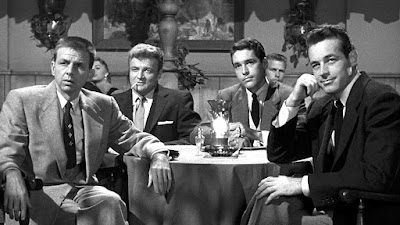 |
| Four vets attending college on the GI Bill and a cabaret singer try to rob a Reno casino and pull off the perfect crime. |
‘Five Against the House’ (1955):
Part soap opera, part screwball comedy,
with a heist tacked on at the end
A
The foursome goes to Harold’s casino in Reno, Nev., for a quick shot of gambling before they must turn around and get back to campus. Pop culture enthusiasts may be interested to learn that the film was shot on location at Harold’s, which long ago met with the wrecking ball, as aging casinos do.
By chance, a couple of the guys witness one of the all-time dumbest robbery attempts at the cashier’s window. The would-be holdup man gets caught, but that’s when Ronnie (Kerwin Mathews) gets the idea to pull a stickup of his own. He’s a rich kid who doesn’t need the money, but wants to prove he’s smart enough to rob the joint without getting caught (shades of Leopold and Loeb).
The idea is to leave the stolen loot where the casino can recover it. It’s meant to be a prank. But Brick (Brian Keith), who suffered a head wound in the war, is a wild card in this shaky spectacle. This gimmick recalls William Bendix’s shell-shocked Buzz Wanchek in “The Blue Dahlia” (1946), who may or may not have committed a murder.
The most serious-minded of the group, Al Mercer (Guy Madison), whose on again, off again relationship with Kay (Kim Novak) takes up a chunk of the film’s first 40 minutes or so, plans on a career in law and the prank is clearly not his cup of tea. But he's tricked into going along with the group.
That a band of such well-scrubbed lads would flirt with arrest and possibly deadly consequences is a stretch. The whimsical tone shifts to somber when we realize that there's a deranged maniac among the lads who’s been waiting to show his cards.
We never feel that this band of preppies is up to the task of pulling off such a hoax, but never mind. The film’s final minutes are what makes it worth watching, assuming that you can hang in there that long. The guys employ a clever but highly improbable homemade machine which they hope will make a successful robbery possible — but then things go wrong.
With a bigger helping of hijinx, or a more disciplined approach to the caper, “Five Against the House” could have been a winner. Instead, it runs low on chips toward the middle, and just about folds before the game really gets underway.



